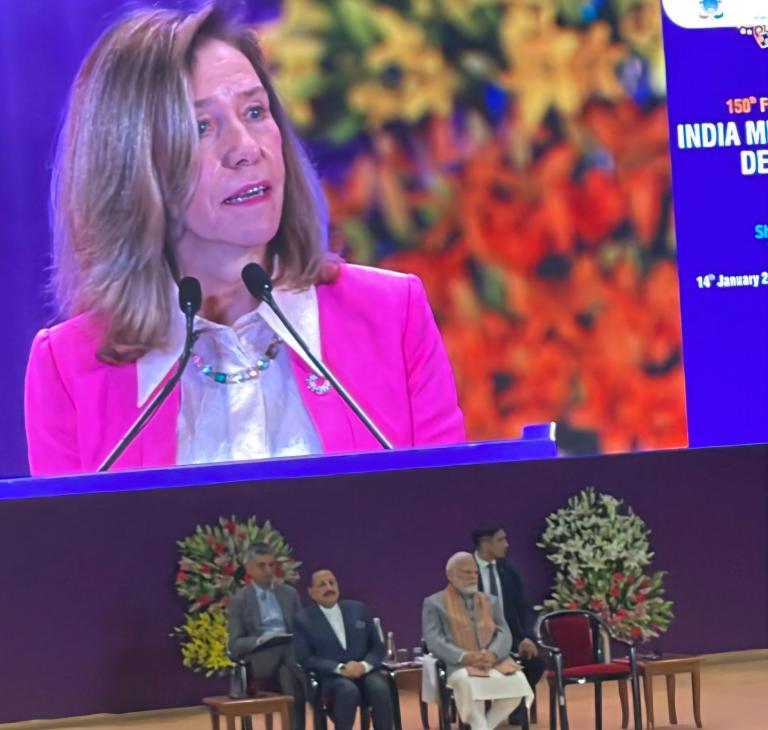WMO joins 150th anniversary celebrations of India Meteorological Department
WMO Secretary-General Celeste Saulo joined Indian Prime Minister Shri Narendra Modi, the Minister of Earth Sciences Jitendra Singh and other dignatories at a celebration of the India Meteorological Department’s (IMD) 150th anniversary on 14 January.

Whilst highlighting the successes of 150 years of service to the nation, the commemoration also looked forward to the future. The Indian Prime Minister unveiled IMD’s Vision-2047 (when India completes 100 years of independence) on weather and climate science and services.
The expected outcome of the Vision-2047 is to minimize the loss of life to zero for all types of severe weather events by enabling disaster managers, stakeholders and the general public to take early action in line with impact-based forecasts and risk-informed warnings.
“Building on our past accomplishments, we want to further modernize aspects relating to meteorology,” said Narendra Modi. The new Vision is “an endeavour to make India a climate smart nation … and will contribute to a sustainable future,” he said.
“IMD plays a fundamental role in disaster risk reduction by protecting communities from extreme weather events. Its expertise also supports key sectors such as agriculture, water resource management, energy, tourism, aviation, and public health. The commitment to public service resonates deeply with WMO’s core mission of ensuring a safer and more resilient world for all,” she said.
“The socio-economic benefits are huge. And my message today is that investment in National Meteorological and Hydrological Services is a win-win for everyone,” said Celeste Saulo.
As a founding Member of WMO since 1950, an Indian representative has been on WMO’s Executive Board for more than 60 years – longer than any other country in the Asia-Pacific region. Mrutyunjay Mohapatra, the Director-General of Meteorology and Permanent Representative of India to WMO, currently serves as the Third Vice-President of WMO.
IMD is an invaluable partner in WMO activities, including in severe weather forecasting, flash flood warning systems, seasonal climate outlooks and education and training. It hosts several WMO-designated regional centres, including the Regional Specialized Meteorological Centre (RSMC) New Delhi Tropical Cyclone Centre.
“Accurate forecasts and warnings and coordinated disaster management have saved countless lives not just in India, but in the entire region. Tropical cyclones used to claim tens of thousands of lives. Thankfully, this is now a nightmare of the past,” said Celeste Saulo.
India’s commitment to climate monitoring and early warnings aligns perfectly with the international Early Warnings for All campaign, she said.
Like many other countries (and the globe), India had its hottest year on record in 2024. The country suffered prolonged extreme heat, which greatly impacted human health, agriculture, water management and energy supplies. Heavy monsoon rains caused disruption and death, including in devastating landslides in Kerala in July. More recently, air pollution hit alarming and dangerous levels in many parts of the country, recalled Celeste Saulo.

Vision 2047
Vision 2047 aims at 100% detection of all types of severe weather at the village and household level, with the augmentation of meteorological observational systems up to village level, supported by remote sensing systems like satellites and radars. It aims to improve weather forecasting accuracy such that there is almost zero error in the forecast up to 3 days, 90% forecast accuracy up to 5 days, 80% accuracy up to 7 days and 70% accuracy up to 10 days.
“The Vision 2047 document will help in mainstreaming weather and climate information so as to make Bharat (India) a weather ready and climate smart nation and mainstream the weather and climate information with all national objectives so as to improve our socio-economic conditions,” wrote Mrutyunjay Mohapatra.

